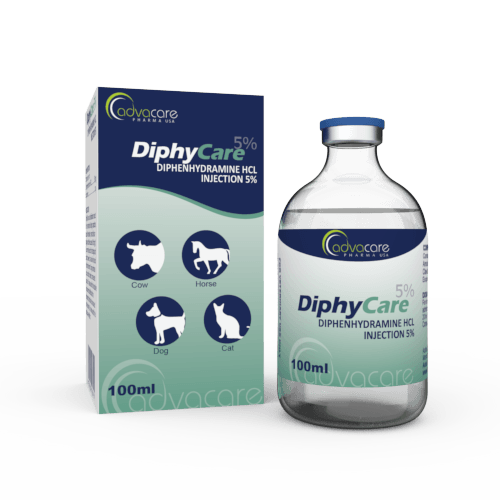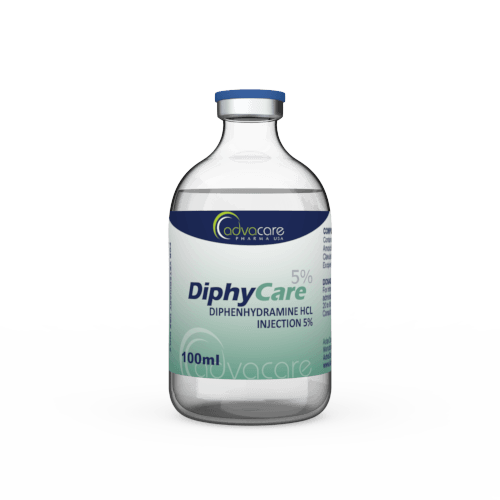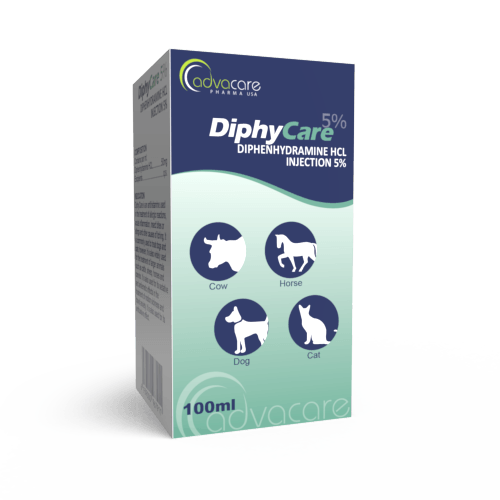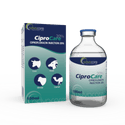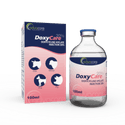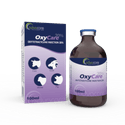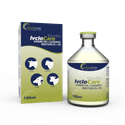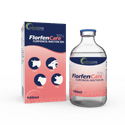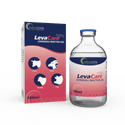- Home›
- Veterinary Pharmaceuticals›
- Veterinary Injections›
- Veterinary Liquid Injections›
- Diphenhydramine Injection
Diphenhydramine Injection
Dosage
Packaging
What is Diphenhydramine?
Active Ingredients: Diphenhydramine HCl
Diphenhydramine Injection is an antihistamine drug used for acute inflammatory and allergic conditions in animals like cows, horses, dogs and cats. It may be used to treat life-threatening allergic reactions, such as anaphylaxis, along with Epinephrine (Adrenaline). Diphenhydramine is also prescribed to treat canine motion sickness.
Diphenhydramine belongs to the family of medicines called antihistamines. It works by inhibiting the action of histamine at the H1 receptor. This blocks the immediate effects of histamine release, such as increased capillary permeability, bronchoconstriction, and gastrointestinal and respiratory secretions. It also prevents the immediate and delayed vascular effects, which may include redness, swelling, and itching characteristic of allergic reactions.
Histamines are naturally occurring substances in the body that are released during allergic reactions. When an animal is exposed to an allergen, the immune system responds by releasing histamines. By blocking the receptors, diphenhydramine effectively reduces or prevents the symptoms associated with histamine release.
Diphenhydramine also exerts sedative effects due to its central nervous system (CNS) activity. This action can be helpful in calming animals that are distressed, but it can also be utilized in scenarios where mild sedation is needed, like during long travels. The antiemetic properties of the drug also make it effective in preventing motion sickness in dogs.
It is important to note that this formulation of AdvaCare's Diphenhydramine Injection is for veterinary purposes only, and whilst there are types available for human use, this injection is intended to be prescribed by a veterinary doctor or animal care specialist for an animal.
AdvaCare manufactures this veterinary medicine in GMP-certified factories located in China, India, and the USA. Our extensive portfolio of medications provides professionals and pet owners with a trusted source for meeting the healthcare needs of their animals, backed by rigorous quality standards and global accessibility.
Why are we a trusted Diphenhydramine manufacturer?
Diphenhydramine Injection is manufactured and globally distributed by AdvaCare Pharma, a leading manufacturer of veterinary injections in the pharmaceutical industry. We have been committed to distributing high-quality, GMP-certified veterinary medications for the global market over the past 20 years. As a top Diphenhydramine manufacturer, we ensure that all of our 100+ veterinary injections surpass our distributors' requirements by conducting routine internal and third-party facility audits.
Uses
What is Diphenhydramine used for?
It's used to treat inflammatory and allergic conditions, such as:
- allergies or hypersensitivity responses
- inflammatory disease
- pruritus
- allergies due to feed or other medicines
- anaphylactic shock
- sudden shock or laminitis in ruminants
- aseptic total
- emphysema (in horses)
- asthma
- insect or snake bites
It is also used as a mild sedative or to treat insomnia and motion sickness.
What animals can be treated with Diphenhydramine Injection?
It's recommended for cows, horses, and companion animals like dogs and cats.
How is a Diphenhydramine Injection used?
This medication has been manufactured as a liquid, which is packaged in a vial. It is intended to be administered by injection in the vein, muscle, or under the skin. Diphenhydramine HCl Injection is intended for veterinary use only.
What is the withdrawal period for Diphenhydramine?
The withdrawal time for this medicine is 1-7 days after the final treatment. For milk, the withdrawal period is 1-3 days. Follow specific withdrawal guidelines ensure that there are no residues in animal products that could be consumed by humans.
Are there any known resistance issues with Diphenhydramine in animals?
As of now, there is no widely reported resistance to Diphenhydramine HCl in veterinary medicine. However, as with all drugs, overuse or incorrect dosing can potentially lead to reduced efficacy over time.
Can Diphenhydramine be administered to animals for extended periods?
Diphenhydramine HCl is primarily indicated for acute conditions, offering temporary relief from allergic symptoms and inflammatory responses. Chronic administration may result in increased risk of adverse reactions, including sedation, anticholinergic effects, and potential organ stress. Veterinarians typically prescribe this drug for short durations, and any extended use requires careful monitoring and consideration of the animal's overall health profile.
Can Diphenhydramine be used in animals with pre-existing medical conditions?
It depends on the condition. Animals with specific pre-existing conditions, such as urinary retention, glaucoma, or severe cardiac conditions, may not be suitable candidates.
Are there any known interactions with other medications?
Diphenhydramine may interact with other drugs, including central nervous system depressants or anticholinergic drugs.
Can Diphenhydramine Injection be used as a tranquilizer for animals with behavioral issues?
While the drug may have mild sedative effects, it is not typically used as a primary tranquilizer to address behavior problems. Veterinarians may recommend other medications or modification techniques for managing such concerns.
How quickly does the drug typically show noticeable effects in animals?
The onset of action depends on the route of administration, but it is generally relatively quick, often within 15-30 minutes. The effects may also last for several hours, necessitating possible repeat doses for sustained relief.
How should an overdose of Diphenhydramine be managed?
In case of a suspected overdose, seek immediate veterinary intervention. Overdose can lead to extreme sedation, respiratory depression, hyperexcitability, or seizures. Supportive care, such as fluid therapy and maintaining open airways, may be necessary depending on the symptoms.
How should Diphenhydramine Injection be stored?
This medication should be stored in a dark, dry location between 20-25°C. The vial should be sealed tightly.
Dosage
How much Diphenhydramine Injection should be given to ruminants?
For large ruminants, the usual dose is 1-2mg per kg of body weight.
How much Diphenhydramine Injection should be given to dogs or cats?
The usual dose is 2-4mg/kg, given 2-3 times per day. This medicine may not be appropriate for kittens or small cats.
Dosing should always be determined and prescribed by a veterinarian based on the specific needs and condition of the animal. Overdosing can lead to heightened side effects, while under-dosing may result in ineffective treatment.
Signs of overdose may include severe drowsiness, agitation, muscle tremors, seizures, or rapid heart rate. Veterinarians can provide supportive care, which may include giving activated charcoal or specific medications to counteract the effects.
In case of a missed dose, administer it as soon as remembered, but only if it's not too close to the time for the next schedule. If such is the case, skip the missed one and continue with the regular dosing schedule. Doubling up should be avoided.
Refer to a veterinary doctor or pharmacist for guidelines on dosage.
Side Effects
As with all pharmaceuticals, some unwanted effects can occur from the use of Diphenhydramine Injection.
Some common side effects may include but are not limited to:
- lethargy or drowsiness
- dry mouth (xerostomia)
- urinary retention
- gastrointestinal effects, such as constipation or diarrhea
Serious side effects, which should be treated as emergencies, may include:
- severe allergic reaction (skin rash, fever, facial swelling, or difficulty breathing)
- tachycardia (increased heart rate)
For a comprehensive list of all possible side effects of this medication, consult a veterinarian. Should any symptom persist, worsen, or if new symptoms appear, consult a veterinarian promptly.
Precautions
Do NOT use Diphenhydramine Injection for an animal that:
- has a known allergy or hypersensitivity to any of the ingredients.
- is a very young or a neonate.
- is taking Monoamine Oxidase Inhibitors (MAOIs).
- has severe liver disease.
- is suffering from glaucoma.
- has prostatic hypertrophy (enlarged prostate).
Treatment with this drug should be administered with caution if an animal:
- has conditions such as glaucoma, prostate enlargement, intestinal obstruction, COPD, heart disease, or hypertension.
- has elevated thyroid hormones.
- is pregnant or lactating.
- is a working dog.
- is geriatric.
- is undergoing sedation or anesthesia.
- has a history of seizures or epilepsy.
There are known interactions between diphenhydramine and other drugs, including anticholinergic drugs, tricyclic antidepressants, and CNS depressants.
Concurrent use with other anticholinergic drugs may intensify the anticholinergic effects of this drug, potentially leading to increased risk of side effects such as dry mouth, urinary retention, and constipation. Combining diphenhydramine HCl with tricyclic antidepressants or CNS depressants may potentiate sedative effects.
This medicine can affect the results of a skin allergy test. By inhibiting histamine, diphenhydramine can suppress the skin's natural response to allergens, potentially leading to false-negative results. This means that the test may not accurately detect allergies or hypersensitivity reactions. Treatment should stop at least 2 weeks prior to this kind of test.
What are the most common animals Diphenhydramine Injection is used for?
Animal physicians use Diphenhydramine Injection for a wide range of animals, including:
- Dogs: Diphenhydramine is frequently used in dogs to manage allergic reactions, itching, or hives, providing relief from discomfort associated with allergies or insect bites.
- Cats: Cats may receive Diphenhydramine to address allergic reactions or itching, similar to dogs.
- Horses: In horses, the drug is used to manage allergies, insect bites, or hives.
- Cattle: Diphenhydramine may be used in cattle to treat allergic reactions or to alleviate itching caused by insect bites or other skin conditions.
- Goats: Goats may receive Diphenhydramine for similar indications, such as allergies or itching due to external irritants.

You might be interested in...
Why AdvaCare Pharma?
As an industry leader, we are aware of our responsibility to provide affordable and sustainable solutions to improve healthcare worldwide.
